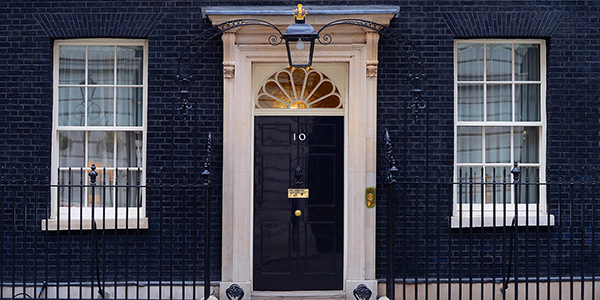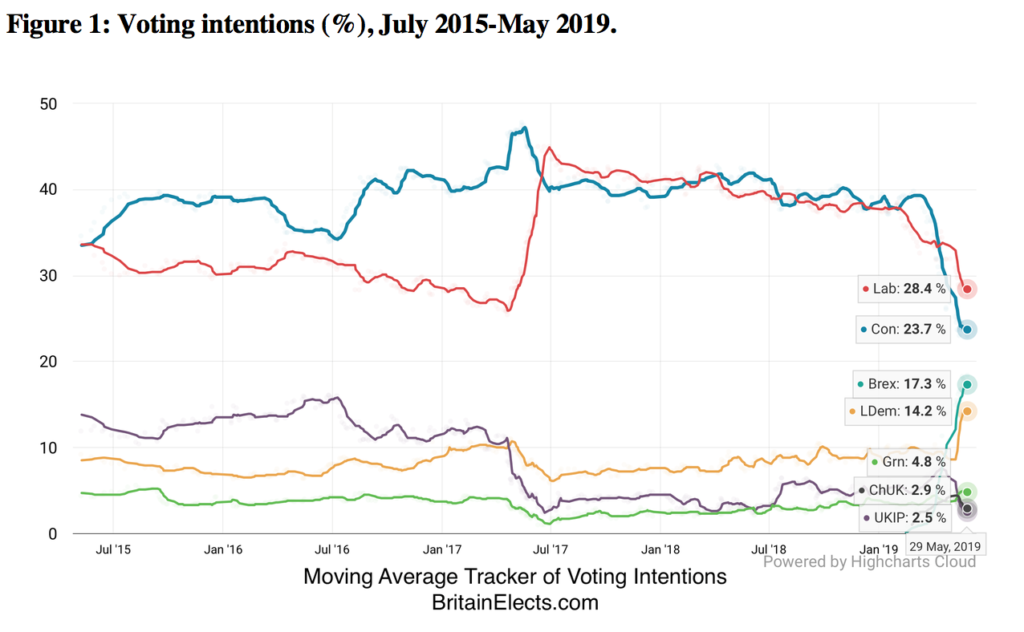Tough and tender: the winning formula for the next Prime Minister
Eleven Conservative MPs are currently running to succeed Theresa May. Whoever emerges from this contest as the next Prime Minister, they will need to have the human and technical skills to tackle both the emotional divisions of the country and the challenges of Brexit, writes Tony Hockley.

10 Downing Street Picture: Defence Images /© Crown Copyright 201, Photographer: Sergeant Tom Robinson RLC/ (CC BY-NC 2.0) licence
Over the summer the Conservative Party will be choosing Britain’s next Prime Minister. The winner will face an exceptional challenge. They must be capable of leading the country through Brexit and beyond its causes and consequences. They will firstly have to gain the confidence of their parliamentary colleagues and of the Conservative Party, but never lose sight of the fact that they must quickly also gain the confidence of their political opponents and of the wider electorate. It is clear from the experience of Theresa May and Jeremy Corbyn that confidence cannot be achieved by splitting the difference on Brexit.
On the other hand any candidate who avoids splitting the difference simply by making light of the economic repercussions of a ‘no deal’ Brexit or assuming that the Withdrawal Agreement can be renegotiated is also probably doomed to disappoint within months. If so, we shall be back to stalemate very quickly indeed. We must hope that the next Prime Minister combines brilliance in communication with the determination and attention to detail that will be required to overcome the practical challenges of Brexit. To succeed, they will need the type of leadership qualities that can earn support from friend and foe alike.
There have been multiple and sometimes very imaginative interpretations of the May 2019 EU election results. What seems most incontrovertible from the experience of recent months is that that support for the two major parties in England collapsed when the UK did not leave the EU on the scheduled day in March 2019.

Instead of the collective sigh of relief that the agony of uncertainty was finally over, the whole country is now aghast that it may face the interminable pain of a never-ending Brexit process. The reluctance by most candidates for PM to think of a further delay beyond October 2019 is understandable, but it has led to a widespread fudging of answers on the key questions they face.
Writing in The Guardian following May’s resignation the Lord Chancellor, David Gauke MP, spelt out four ‘hard realities’ that every candidate should be demanded to address openly and honestly. In short, Gauke set out four questions for answer:
- How the considerable, immediate costs of ‘no deal’ would be met;
- How the Irish Border would be kept open (deal or no deal);
- How a parliamentary majority will be achieved for a deal;
- How another general election in pursuit of a majority would not put Jeremy Corbyn in Downing Street.
Gauke rightly argues that the time for ‘wishful thinking’ on Brexit is over, as yet another deadline for leaving looms a few months ahead. Addressing these hard realities will require confidence and competence in equal measure: confidence amongst the public that they have a believable and inspiring vision of a better tomorrow, and competence to tackle the thorny, technical challenges involved.
A clear and trusted plan must be hatched to develop and implement a technical solution for the Irish Border. Only then could a Prime Minister have any chance of securing sufficient cross-party support to achieve parliamentary approval for a Withdrawal Agreement, and thus avoid the need for another snap general election. Only then will the threat of the backstop be eased. There have been hints of such a solution, but no substance. No amount of hints or wishful thinking will achieve this.
For their part, EU negotiators appear to have purposely ‘weaponised’ the Irish border as a tactic to oppose Brexit, and to have used the negotiations as a tool to put other Member States in fear of following the British out the door. Both strategies have worked well for Brussels, but neither has helped facilitate an orderly withdrawal for the UK. As a result, three years have been wasted with no real work towards finding a workable solution for the Irish border. Even if the EU agreed to some renegotiation of the Withdrawal Agreement, which seems highly unlikely, it would not sign an agreement that did not include provision for the future of the UK’s open land border with the EU. There must either be an arrangement that permanently maintains the open border, or a transition period with a backstop in case of failure. Deal or no deal there is no escaping this reality.
Only a candidate who has the credibility to deliver an, as-yet-unknown, solution to this problem could carry the confidence that the ‘backstop’ will really never prove unnecessary. They will have to do so from a standing start. The fact that this seems to require a track record of competent policy delivery may rule out most of the current crop of candidates. It also seems unlikely that another Prime Minister who has not been a consistent supporter of Brexit from the time of the referendum campaign would carry sufficient trust amongst those who voted for Brexit to gamble against the backstop in this way. Again, this seems to rule out several more candidates.
The task of facing down these hard realities has to be combined with a thorough reconnection with the electorate, across the Remain-Leave divide. Whilst a rational technocrat may well be able to develop and deliver solutions to the practical economic and technical challenges, the opposite of a ‘Maybot’ is needed to reconnect with the general population. Securing support for a withdrawal agreement may help restore some faith in mainstream politics, but it will not deliver the support required to obtain a majority from the next general election.
It is too easy to assume that a youthful Prime Minister would enjoy youth support. But perhaps youth appeal is more about outlook than age. Support for the Labour party surged under 41-year-old Tony Blair in 1994 and, albeit for a shorter time, under Corbyn at 66 in 2015. The Conservatives under William Hague, aged 36 in 1997, experienced no ‘youth-quake’. The truth is that freshness is probably more about authenticity than age.
Why was ‘Cool Britannia’ an apparently genuine approach in the early years of the Blair government, yet Hague was ridiculed for wearing a baseball cap? Why was Corbyn popular with young people, with no attempt to be ‘cool’? Indeed, how did Attlee win a landslide election victory in 1945 at the age of 62, at a time when average male life expectancy was around 65 years? Those who have succeeded have connected with the aspirations of the time. Whilst it is natural to fear the worst, particularly after the 2008 crash that ushered in a decade of austerity, it is also natural to wish to seize on apparently genuine offers of real progress. Recent research for Onward showed a shared concern for Brexit and the NHS across the spectrum of age. Beyond these issues, however, it revealed highest concern for the environment amongst people aged under 35, and for housing amongst young people in London. At the time of writing these issues have been notably absent from the leadership campaign.
Over the past three years too many politicians and institutions across the EU have thought it in their best interests to prioritise polemics over policies. At this year’s EU elections they were told how wrong this was, with a widespread desertion of establishment parties. In short this seems to have been caused by three factors: their apparent disdain for much of the population, felt most keenly by those of us who voted Leave in 2016; neglect of issues of great concern; and the absence of a positive vision for the future.
Whoever emerges from the current contest to be the next Prime Minister has to have the human and technical skills to tackle both the emotional divisions of the country and the gritty challenges of Brexit. They must be both tough and tender.
This article gives the views of the author, not the position of Democratic Audit. It was first published on the LSE’s British Politics and Policy blog.
About the author

Tony Hockley is Director of the Policy Analysis Centre Ltd and a Visiting Senior Fellow in the Department of Social Policy at the LSE. Prior to teaching at the LSE, from which he also holds a PhD in social policy reform, he was a Special Adviser in the Government led by John Major, and Adviser to David Owen, Leader of the Social Democratic Party. He has also worked on several past Conservative leadership campaigns.





 Democratic Audit's core funding is provided by the Joseph Rowntree Charitable Trust. Additional funding is provided by the London School of Economics.
Democratic Audit's core funding is provided by the Joseph Rowntree Charitable Trust. Additional funding is provided by the London School of Economics.
So this piece was posted by Democratic Audit. But where is democracy in all this?
Shouldn’t we be asking why UK citizens aren’t involved in the selection of our Prime Minster?
And aren’t there wider questions about how the Brexit questions (4 good ones) could possibly be solved by an undemocratically elected government? Well most (57%) of us didn’t vote Conservative.
How seriously should we “respect” a referendum which turns out to have numerous illegalities reported to the police for investigation?
Should a democracy tolerate micro-targeted social media campaigning? Phhew – I could go on.
The good news is that if we’re interested there is a system for resolving at national level differences of opinion. It’s called democracy. Only I don’t notice anyone working out and describing how democracy can benefit us in this way. Btw, referendums are systems for forcing differences of opinions.